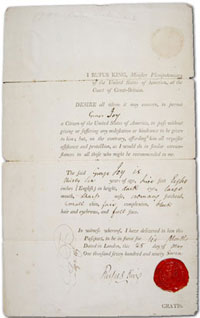
History notes in the compiled correspondence of Rufus King that by August, 1797 both King and George Joy were residing on the continent
of Europe and crossed paths later that year; King in the capacity of U. S. Minister to Great Britain and Joy at his post in Rotterdam as
Consul for the United States. It is not clear if this passport signed by King for Joy and dated 5 May 1797 was issued to facilitate Joy's
journey abroad, but on August 22nd 1797, in the first of a series of King's correspondence relating to the security of the Marquis de la
Fayette and his family, there is a reference to Joy. In the letter King was informed by U.S. Consul at Hamburgh S. Williams that the
Marquis would soon be at liberty and would be granted safe passage to America either through Hamburgh, aided by Williams or by way of
Holland with the help of George Joy. Lafayette had spent the last four years imprisoned by the Austrian government at Olmutz and was
in poor health. King sent a copy of Williams' letter to General George Washington alerting him to Lafayette's circumstances.
By October 3rd, final arrangements were made for Lafayette, his Lady and two daughters to embark in Mr. Joy's ship for Philadelphia.
In a personal letter from Lafayette to Rufus King, Lafayette explained that because of his wife's ill health and her difficulty in
securing monies from her estate in France, their winter journey to America would have to be postponed.
Lafayette finally revisited America in 1824 but returned to France where he died in 1834. Rufus King's prolific career in politics continued
into the 19th century when he was called out of retirement in 1813 to serve a third term in the U.S. Senate. His family estate still stands in
Jamaica New York surrounded by what is now known as King Park. George Joy, a self styled expert in foreign policy, continued to live abroad
although he became a strong proponent of James Madison. Joy's 127 letters to Madison are now available on microfilm at the Library of Congress,
in the Madison papers archive.
Bibliography R. Beeman, The Papers of James Madison, The William and Mary Quarterly, v.43, p.304, 1986; H. Eberlein,
Manor Houses and Historic Homes of Long Island and Staten Island, p. 158-163, New York, 1966 ; C. King ed., The Life and Correspondence of
Rufus King, comprising his letters, private and official, his public documents, and his speeches, v.2 1795-1799, pp. 214-232, New York, 1971;
A. Smith. Mr. Madison's War: An Unsuccessful Experiment in the Conduct of National Policy, Political Science Quarterly v.57, p.242, 1942; Louisiana
Digital Library Collection Online, available at http://louisdl.louislibraries.org/ [accessed 28 June 2005].
|

